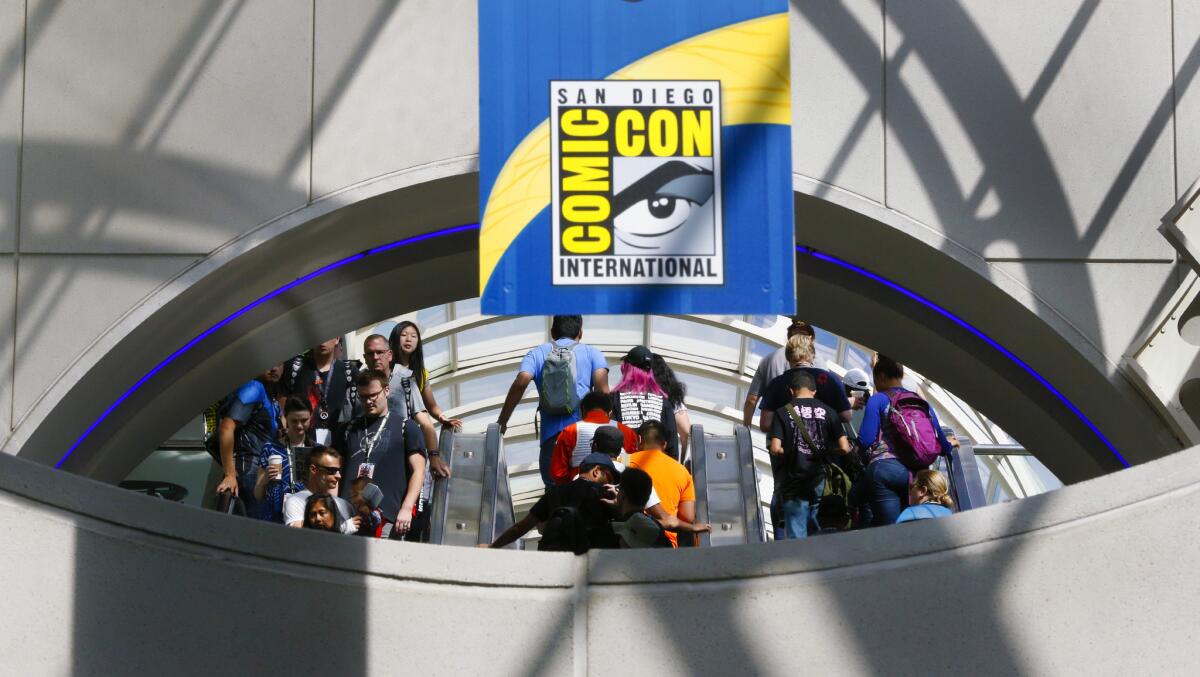Here’s a switch: Comic-Con gripe session elicits plenty of praise, applause

As Comic-Con wound to a close Sunday, attendees took time out from the exhibit floor and popular panel sessions to line up in an upstairs meeting room so they could give convention organizers a piece of their mind — as they do every year.
Except this time, praise, applause and cheers were uncharacteristically in abundance as one Comic-Con-goer after another said they were pleasantly surprised to see how smoothly much of the sold-out convention went this year.
“This is Comic-Con No. 18 and this really felt like it used to and that’s a good thing,” said Natalie Haspel, addressing John Rogers, president of Comic-Con International’s board of directors. “Things felt a lot more seamless.”
While there were still plenty of the normal gripes about management of long lines and discourteous treatment of the disabled, the tone of the annual talk-back session felt much more laudatory than years past.
It is hard to know what exactly contributed to the more upbeat mood, but there were a couple of changes for this Comic-Con that attendees universally cheered.
Top of the list was the decision to shut down Harbor Drive to motorists for the first time ever. The normally heavily trafficked boulevard was closed between First Avenue and Park Boulevard to all vehicular traffic, except for emergency vehicles and shuttle buses. The net effect was to widen the area directly in front of the convention center to only those pedestrians with badges, also a change from previous years.
“I’m a 24-year Comic-Con vet and for the first time in so long, I had so much fun at this convention,” said Romeo Tayloga. “This year I have no complaints. And the Harbor Drive closure, will that be the norm going forward. Please?”
Rogers, who normally says little during the talk-back sessions, choosing instead to listen and take notes, said more feedback is needed before making a decision for next year.
“There are months of meetings to come, looking at how well that worked, what were the manpower resources versus. the past, unanticipated problems,” Rogers said. “For all I know, everyone in the Gaslamp is writing their councilman saying it was the dumbest idea of all.”
Gil Cabrera, president of the San Diego Convention Center Corp. board and a fan of Comic-Con, said Sunday that the center supports closing Harbor Drive again when Comic-Con returns.
Another change this year was the system for acquiring elite autographs and exclusive merchandise from top vendors like Funko, Hasbro and Lego. Instead of a first-come, first-served system, Comic-Con instituted an online lottery process.
Most attendees stepping up to the microphone Sunday said they preferred the new system, even if they didn’t win.
Not as pleased with the lottery system was Liam Olive, a devoted fan of Stephen King’s books.
“When I heard “Castle Rock” (a Stephen King-focused series) was doing a signing, I said I’ll wait two days for that,” Olive said. “But with the online lottery system, someone could never have read a Stephen King book but have an equal chance as me. Maybe you could have a blend of half and half because there are fans of the lottery system and also standing in line.”
Leading up to this year’s convention, there had been much buzz about the announced absence of Marvel Studios, a Comic-Con staple in the always-packed Hall H, as well as HBO’s “Game of Thrones” and “Westworld.”
One attendee alluded to the no-shows her in her comments to Rogers.
“This may sound like a back-handed compliment but given that Marvel wasn’t here, that probably helped with the insanity that is the Hall H line,” said Kelani Cummings. “I got in every time I wanted to.”
Kris Lewis, seated in a wheelchair, was first in line Sunday to address Rogers, armed with pages of notes. She reeled off concerns about how disabled attendees are sometimes disregarded, but stressed that a written set of guidelines needs to be made available.
For the ADA (Americans with Disabilities Act), you have an inconsistent message,” Lewis said. “One person will tell you one thing, another will tell you another...There needs to be something we can do to make sure everyone knows how everything works. There is no written ADA policy. There is nothing that I as an attendee can pick up and see that this is what you should do.”
Like other Sunday afternoon speakers, Kevin Ring, a 44-time attendee, could muster little to complain about.
Interviewed afterward, he said he was at a loss to explain the high number of compliments, although he noted a change this year in how organizers doled out Hall H wristbands with a different design and color each day. That helped cut down on fraudulent entry into the 6,500-seat ballroom, he said.
“I just think they’re learning each year.”
Business
lori.weisberg@sduniontribune.com
(619) 293-2251
Twitter: @loriweisberg

